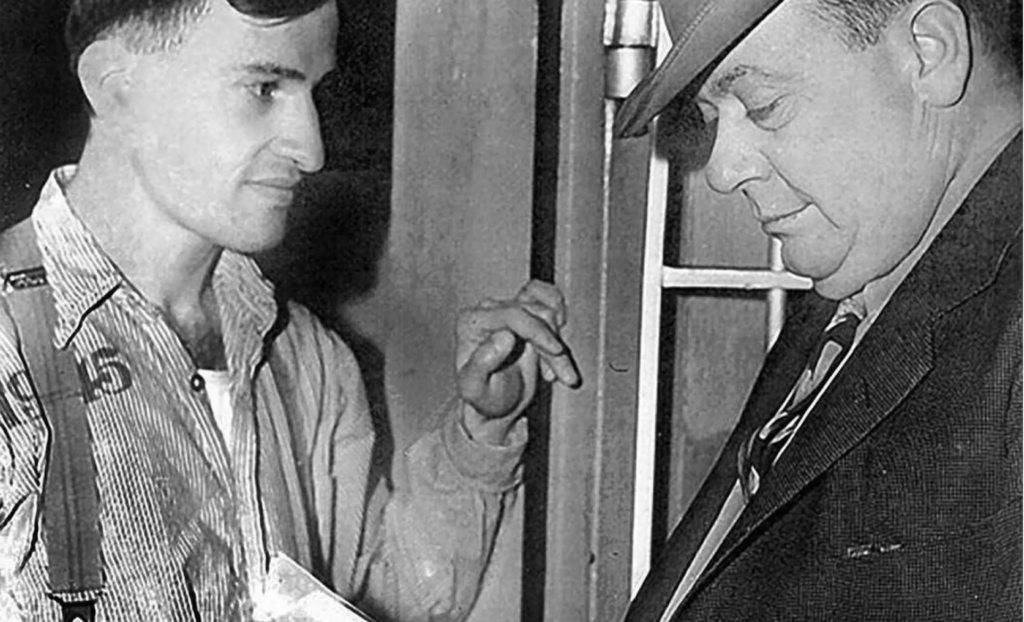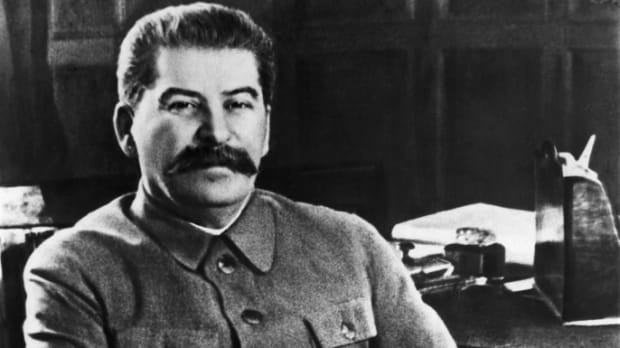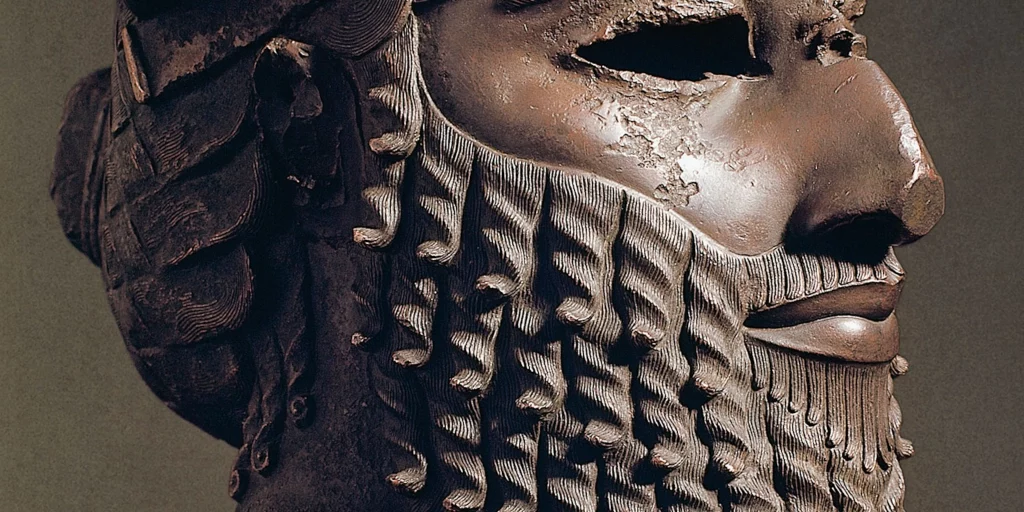The fact that Joe Arridy was innocent couldn’t save him from being executed for the rape and murder of two local teenage girls whom he had never met.
It was January 6, 1939, and the mentally challenged 23-year-old, who had an IQ of 46, apparently had a hard time grasping what it meant to die. He was a sweet young man with the intellectual development of a six-year-old.
His primary concern that day had nothing to do with death or the afterlife. It was whether or not he would be able to finish the ice cream that he had requested as his last meal.
Once the warden assured him that his ice cream would be saved for him, Joe Arridy walked up the hill to the gas chamber accompanied by the warden and the prison chaplain. Joe didn’t resist, because he was oblivious to what was about to happen to him.
His memories of the prison were of playing with his toy train, laughing with other inmates, and getting to know the warden, who had grown quite fond of him. How could he suspect such a violent end?
As Joe ascended the hill, it must have seemed like a typical stroll. Only this stroll up the hill ended in a little room with a wooden chair. A room from which Joe Arridy would never walk out.

Joe Arridy Was Bullied As a Child
Joe’s parents were immigrants from Syria who also happened to be first cousins. This may have led to the genetic consequences that left their son intellectually challenged.
Joe was born mute and didn’t speak for five years. Many of Joe’s siblings died while still very young and one of his brothers who did manage to survive was labeled a “high moron.”
He was unable to keep up with other children his age. And after just one year in elementary school, the principal told Joe’s father that Joe didn’t belong with the other children and that he should keep him at home.
When Joe was ten years old, his father lost his job at a steel company. No longer able to care for him, he sent him to a “State Home for Mental Defectives.” There, away from his family, Joe was bullied incessantly, both physically and verbally.
The fact is, Joe Arridy, with such a low IQ, was vulnerable to abuse. He spoke slowly and struggled to string together long sentences. He was highly suggestible and a target of manipulation.
The man who ran the home stated later that he was “often taken advantage of by the other boys.” And that once they got him to take the fall for stolen cigarettes even though he had nothing to do with the crime.
After enduring a decade in the home, Joe finally ran away at the age of 21 years old and began hopping trains. This was during the Great Depression, when hobos crisscrossed the country on the backs of trains, struggling to make their way in a collapsing economy.
Joe joined them, which is how he ended up in the rail yards in Cheyenne, Wyoming in August 1936.
The Questionable Confession of Joe Arridy
On August 14, 12-year-old Barbara Drain and 14-year-old Dorothy Drain were beaten and raped in their family home.
Both sustained hatchet blows to the head during the vicious attack. Barbara somehow managed to survive, but Dorothy was not so lucky. She succumbed to her wounds shortly afterward.
The shocking brutality of the assault created a sense of pressure on local police. The community was horrified by what happened and they demanded answers.
Unfortunately, the police did not have a whole lot to go off of. All they knew was that the attacker had been short and “Mexican,” according to Barbara.
Thanks to the efforts of the police, it did not take long to round up a prime suspect – a Mexican laborer named Frank Aguilar who had previously been fired by Barbara and Dorothy’s father.
As evidence mounted against him, everything pointed to Aguilar as being the killer. An ax head was found in his house and he was even identified by Barbara as having been the attacker.
Aguilar eventually confessed to the crime and was executed in 1937. That really should have been the end of this horribly tragic episode. But unfortunately, at least one investigator was not satisfied.
Eleven days after the assault, Sheriff George Carroll arrested Joe Arridy whom he found walking around the rail yard. Joe had a dark hue to his skin due to his Middle Eastern heritage. The sheriff thought that he could have been the “Mexican” that they were supposed to be searching for.
Carroll interrogated Joe for eight hours without ever recording any information. During the questioning, Joe clearly had no idea about the murders. But curiously, Carroll was able to extract a confession from Joe that implicated him in the crime.
A trial ensued. During this, Joe Arridy was forced to endure an endless series of questions from the prosecutors, many of which were unfairly leading.
For example, at one point the sheriff asked Joe if he liked girls. When Joe responded with a ‘yes,” the sheriff immediately followed up by asking him if that was the case then why did he enjoy hurting them?
Joe, who investigators determined had the intellectual level of a six-year-old, was easily duped into providing the answers that his questioners wanted to hear. To make Joe’s situation even worse, he received no special treatment due to his intellectual condition.
The attorneys defending him tried to argue that he did not have the mental capacity to stand trial, but they ultimately lost. Joe Arridy, despite his innocence, was soon on his way to death row.
The “Happiest Inmate” on Death Row
In prison, Joe Arridy got along well with all of the other inmates and befriended many of them. Even the warden felt a sense of paternal responsibility toward the young man. He gave him gifts and even said that he “cared for him like a son.”
To the warden, Joe was the “happiest prisoner on death row.” Although that was no doubt because he didn’t realize he was going to die. According to the warden, on the eve of his execution, all he did was, “cheerfully sit and play with a toy train I had given him.”
Joe’s blissful ignorance may have kept him happy in prison, but it ultimately didn’t save him. On his fateful last day, his mother came to visit him but left before the execution.
When offered his choice of last supper, he requested ice cream but he didn’t seem to grasp the fact that this was going to be his last meal. Before the guards led him to the gas chamber, someone asked him about his imminent death, and Joe didn’t seem to understand.
He simply responded, “Joe won’t die.”
Then he entered the chamber. The guards strapped him to the chair while a grinning Joe Arridy looked all around him. For a moment, a wave of nerves overcame him, but the warden soothed him by holding his hand.
Everything was peaceful for a moment. Joe sat smiling in the chair, while the rest of the room silently waited for what only they knew was coming next.
Joe Arridy became one of the youngest Americans to ever be executed. What’s more, the severity of his mental disability, coupled with the lack of evidence collected during the trial makes this case one of the most tragic examples of unlawful execution in the history of the United States.
As Joe’s defense attorney stated prophetically during his trial, “Believe me if he is gassed it will take a long time for the state of Colorado to live down the disgrace.”
He was right.

